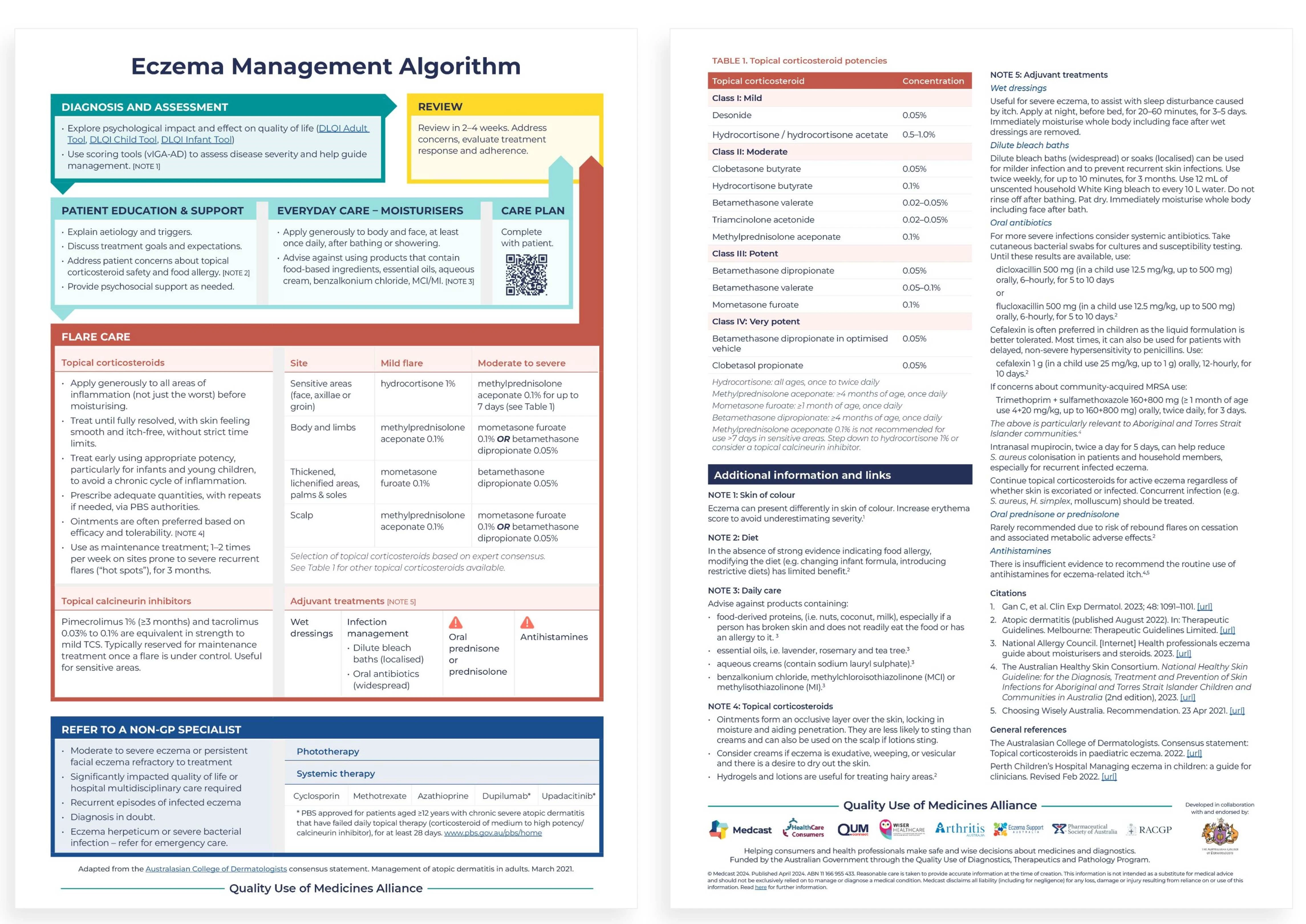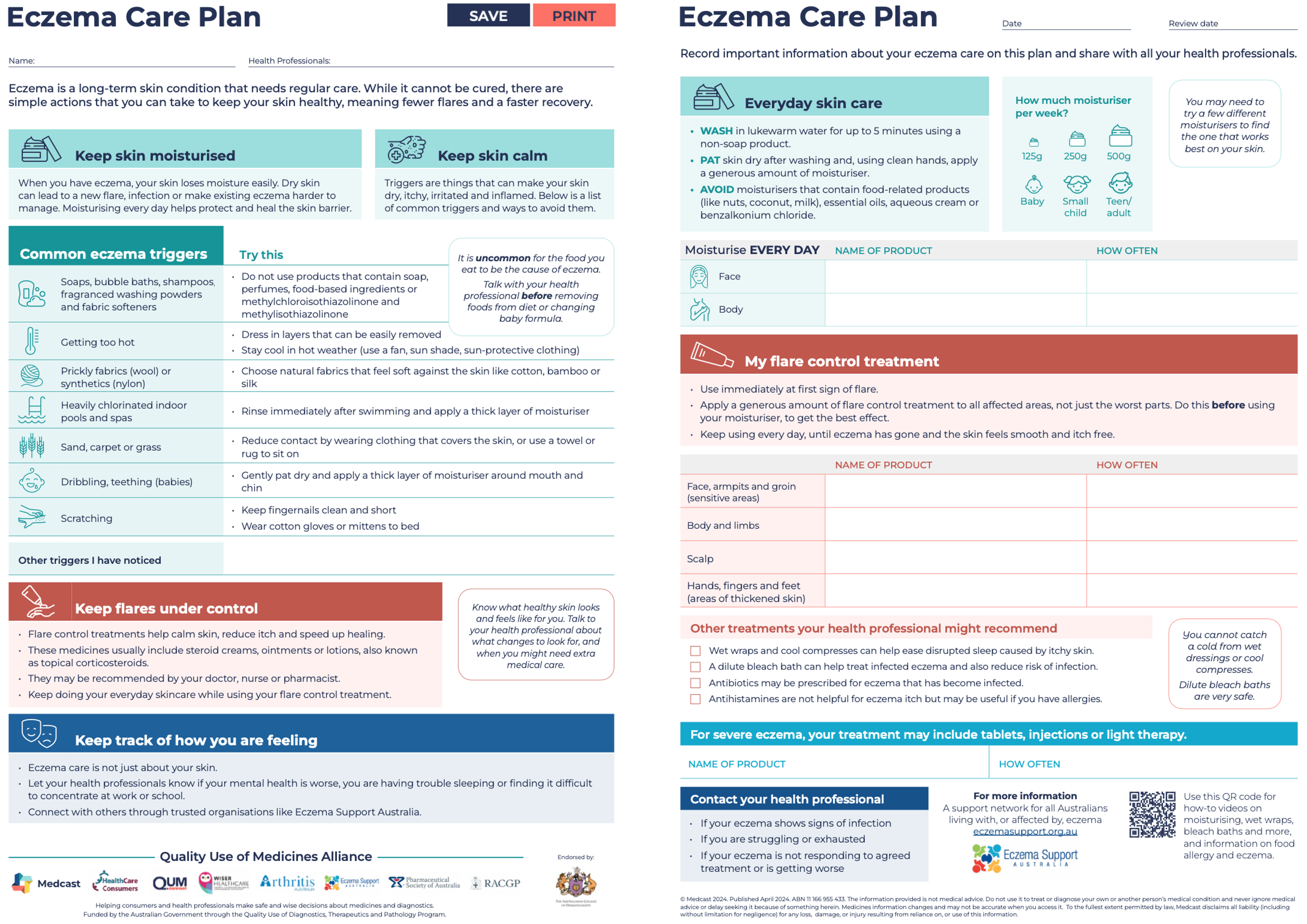Management Algorithm
A clinical algorithm to support the management of eczema in primary care. Covers foundational care, choosing a topical corticosteroid based on site and severity, criteria for referral and useful adjunctive treatments for better eczema care and
control.
Care Plan
A health professional-mediated care plan that can be shared across primary care providers, to ensure consistency of messaging on foundational management and eczema flare control. Patients can record their own specific care information and print for easy reference.
Our Frequently Asked Questions page is designed to answer questions that our audience has raised throughout the eczema program.
The Quality Use of Medicines Alliance has worked with consumers and health professionals to explore the barriers currently impacting eczema care in Australia.
Eczema Resources
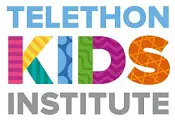
National Healthy Skin Guideline For the Diagnosis, Treatment and Prevention of Skin Infections for Aboriginal & Torres Strait Islander Children and Communities in Australia
Guidelines designed for the prevention, treatment and public health control of eczema and other skin conditions for Indigenous Populations and Communities in Australia.
Format: PDF
Review Date: 2023

Therapeutic Guidelines
Subscription-based Australian clinical guideline covering the diagnosis and management of eczema in children and adults.
Review Date: 2024

Topical Corticosteroids in Paediatric Eczema
This resource provides recommendations on the safe and effective use of topical corticosteroids. It contains a list of common misconceptions of harms associated with topical corticosteroids, a table of steroid potencies and a finger tip unit application guide.
Review Date: 2022
.webp)
Eczema Management Algorithm
A clinical algorithm to support the management of eczema in primary care. Covers foundational care, choosing a topical corticosteroid based on site and severity, criteria for referral and useful adjunctive treatments for better eczema care and control.
Developed by the Quality Use of Medicines Alliance, in consultation with and endorsed by, the Australasian College of Dermatologists.
Review Date: 2024
Eczema clinician FAQ
Designed to address questions raised during delivery of the national Quality Use of Medicines Alliance Eczema Program. Answers are backed by strong evidence or expert consensus to provide clarity around the best practice management of eczema. Regularly updated as new questions arise.
Review Date: 2024

Dermatology life quality index (DLQI) assessment
The Dermatology Life Quality Index (DLQI) is a simple 10 question validated questionnaire that takes approximately 2 minutes to complete, and is designed to measure the health-related quality of life of those living with skin disease. It has been translated in over 110 different languages and can be used across different age groups.
DLQI adult (16 years and over)
DLQI child (4 to <16 years)
DLQI infant (0 to < 4 years)
Multiple language versions (>125 translations)
Review Date: 2019
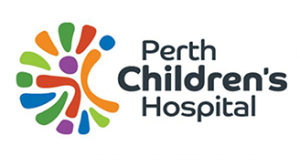
Skin of Colour - Clinician Toolkit
Clinical considerations for clinicians to aid in the assessment and management of children with atopic dermatitis who have skin of colour.
Review Date: 2023

Tele-Derm Service
ACRRM’s innovative online dermatology advice service free for rural doctors across Australia.
Provides access to:
• online specialist support for diagnosis,
management and treatment
• 1000+ education cases and resources
supporting CPD
.webp)
Eczema Care Plan
A health professional-mediated care plan that can be shared across primary care providers, to ensure consistency of messaging on foundational management and eczema flare control. Patients can record their own specific care information and print for easy reference.
Consumers with lived experience of eczema contributed to the development of the plan to ensure the information is relevant, actionable and usable.
Developed by the Quality Use of Medicines Alliance and endorsed by the Australasian College of Dermatologists.
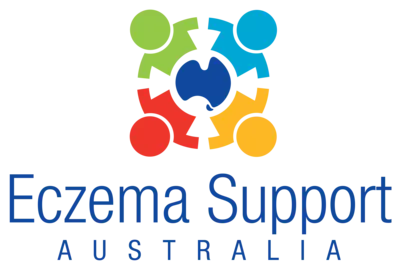
Paediatric factsheet
It is important to understand that you could not stop your baby having eczema. But there are a lot of steps you can take to reduce the effect eczema has on your child.

Nip Allergies in the Bub
This website houses a variety of information and translated resources for parents and health professionals. Videos and fact sheets provide information on how to use bleach baths, wet dressings, apply topical corticosteroids and moisturisers to help manage eczema in infants and children.
Developed by the National Allergy Council, in partnership with the Australasian Society of Clinical Immunology and Allergy and Allergy & Anaphylaxis Australia.


